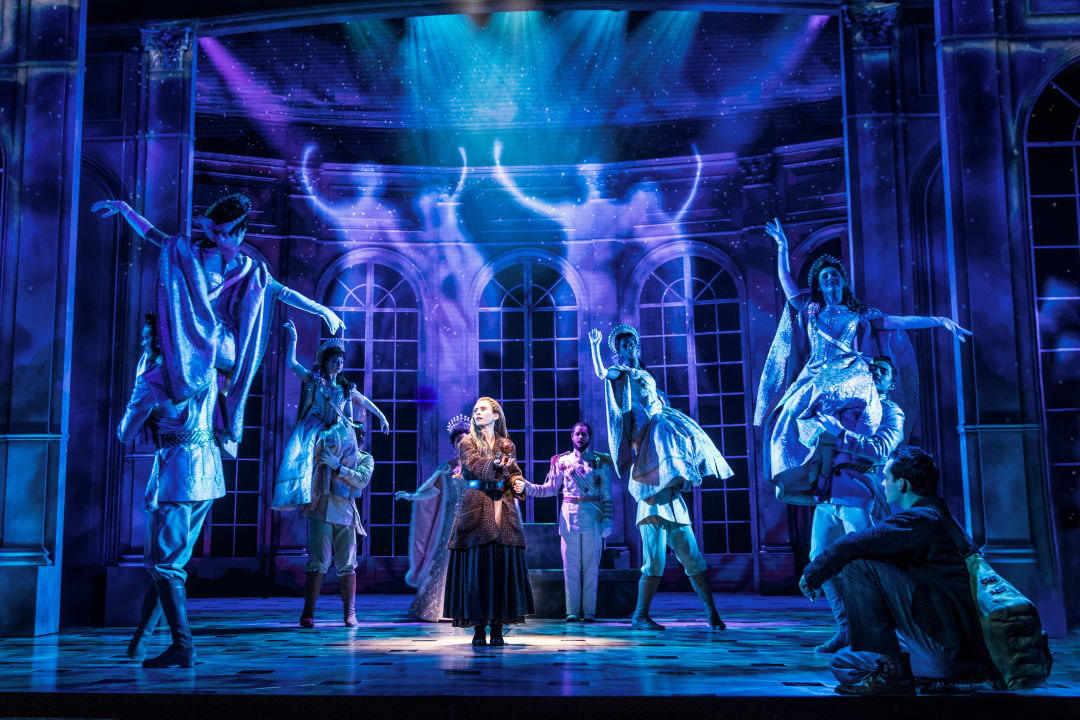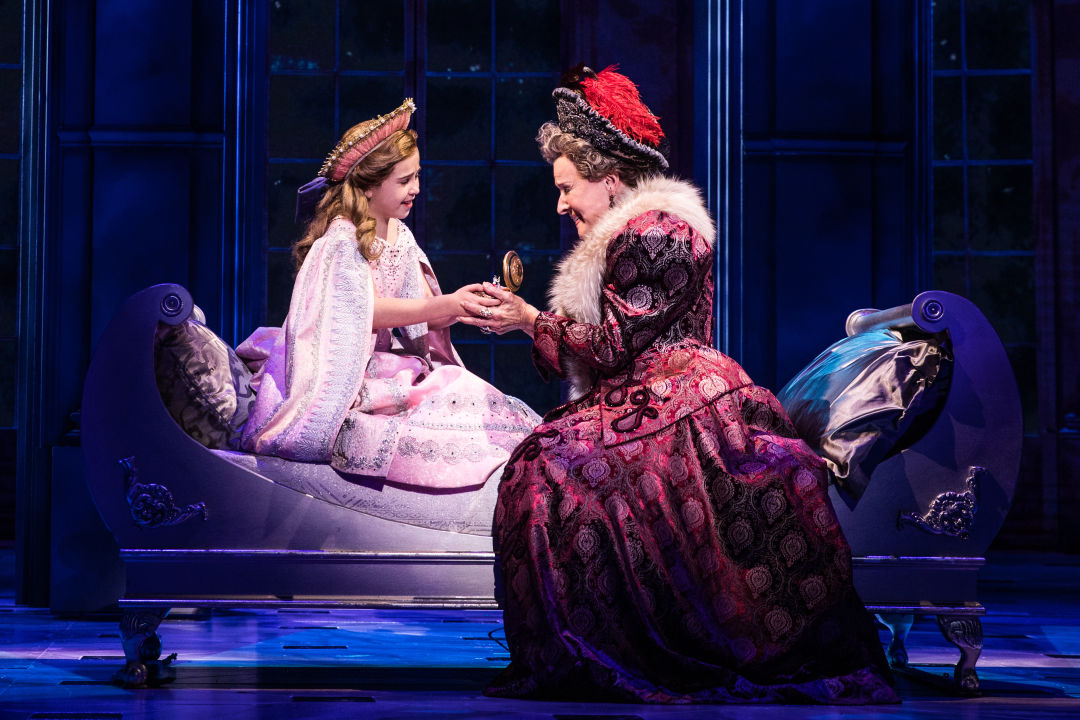Anastasia Suggests Revising History Is Not So Simple

Anya and those pesky historic ghosts.
Image: Courtesy
A revolution is a simple thing, claims one character in Anastasia. But it's clear from this production that revising the very complicated Russian Revolution—and the fate of the titular royal family member—certainly is not so simple.
The actual Grand Duchess Anastasia was born in 1901, the youngest daughter of the Romanov rulers of Imperial Russia, and she died in 1918, executed by the Bolsheviks along with her parents, her three sisters, and her little brother. But what if she had somehow survived? This is the question that numerous imposters tried to answer in the years after her death, and the basis for both stage and screen adaptations. This musical’s answer—courtesy of a book by Terrence McNally and music from Lynn Ahrens and Stephen Flaherty—is quite the spin on known events, which might explain why there’s such a strangely disjointed feeling at the heart of this production.
The story starts with young Anastasia saying goodbye to her grandmother, the Dowager Empress played by an excellent Joy Franz. The two wind up a music box and sing the first version of “Once Upon A December,” a tune that will be heard multiple times throughout the show. Here, they use this song to establish that the grandmother leaves for Paris in 1906, well before the axe drops.
As the song plays out, Anastasia grows up and learns how to dance and smile and pose for pictures, just as revolution—mostly unexplained in its complicated origins—finally leads to a dramatic flash of light, gunshot sounds, and the disappearance of the young princess. Cue Franz’s shining moment, as her character wrenchingly learns that her entire family had been killed back in Russia. While the set features projections instead of more tangible backdrops and scenery, this one scene, set against the darkness, with the old woman jack-knifed in agony over the letter, is more effective than anything that has or will come. If that realness isn’t present, the projections can’t drum it up.

Victoria Bingham (Little Anastasia) and Joy Franz (Dowager Empress) in the national tour of Anastasia.
Image: Evan Zimmerman
From here we jump to 1920s Leningrad, where people are singing about how rough and unpleasant it is to live in a country where food is scarce and spies are plentiful. We get a whole slew of characters, including Gleb (played by Jason Michael Evans, doing what he can in a thankless role) the devoted Communist whose father executed the royal family. Then there’s Anya, a young street sweeper who Gleb is immediately into for reasons that still aren’t clear (yet). And finally, we get introduced to Dmitry, a young commoner who is very ready to get out of Communist Russia, and Vlad, a commoner who got really good at pretending to be a count, also hungry to escape to Paris, where all his surviving aristocratic friends have landed.
Anya is prickly, but she has that certain royal “something” that makes Dmitry, performed with boyish sweetness by Stephen Brower, and Vlad, played by Edward Staudenmeyer, think she can be their ticket out of Russia and to some pretty serious wealth if they convince the Dowager Empress that Anya is her granddaughter. (See where this going?)
Lily Coogan does okay with the role of Anya, and her performance of “Journey to the Past,” which closes the first act, gave me goosebumps. If you can’t otherwise discern why people are so interested in this street sweeper, just go with it. They are, and that’s the whole point of this show.
Once they get to Paris, we’ve already seen the best that Dmitry and Anya have to offer, but they do get one lovely duet, “In a Crowd of Thousands.” The real stars of the show from here on out are Staudenmeyer, who has a great time with one of the play’s only comic relief parts, and Countess Lily, portrayed by Tari Kelly. When Staudenmeyer performs a series of just-this-side-of-ridiculous 1920s-era dance moves, you won’t remember a note of the song that goes with it, but the way his hair flops during the number is exuberant comedic perfection. And Kelly, as the Dowager Empress’s sole lady in waiting, makes such a meal of her part, flashing her gams one second and performing hilarious bits of slapstick the next. You’ll find yourself wishing the whole show had been focused on her and Staudenmeyer instead.
There’s dancing and singing, an entire royal family—children included—slaughtered, an old woman who longs for some vestige her family, and a pair of young people both hobbled by the disfunction of their country to the point they’ve left. As the whole thing rolls toward its conclusion, Gleb (remember him?) shows up to finish the work his assassin father obviously didn’t quite get right that night in 1918. This is where the staging manages to be both clever and kind of ghoulish. As Anya dares Gleb to shoot her, her long-dead family’s final moments are re-enacted in direct parallel, backing away from the gunmen that we know did in fact end their lives 101 years ago, and the life of the real Anastasia along with it.
Somehow from there we lurch to a happy ending, of sorts, but it has the feel of fan fiction, and at the end of the day, that’s what this whole thing is. Which isn’t to say that I didn’t enjoy the experience, oddly enough. It’s fascinating to see the world of musical theater take on such a complicated subject, trying to wrench a happy ending out of such a tragic story. Plus, “Journey to the Past” is such a good song. If you go in with really relaxed expectations, and perhaps a little knowledge of Russian history, you won’t entirely mind how often this thing doesn’t quite work.
Thru March 10. Tickets from $35. Hobby Center, 800 Bagby St. More info and tickets at houston.broadway.com.




